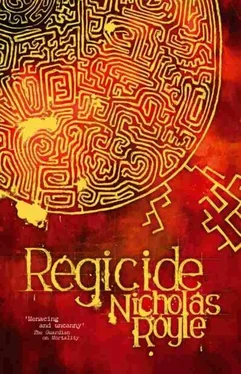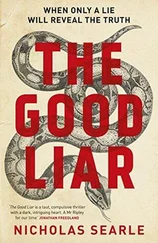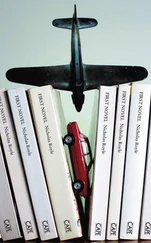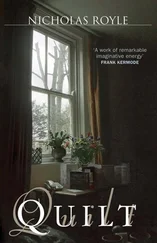I picked up the receiver and the sudden silence seemed louder than the persistent ringing. The Bakelite felt clammy in my hand and the receiver slipped as I lifted it to my ear. A woman’s hysterical voice screamed down the line — ‘Carl! Help! Come quickly, Carl! Please!’ — then was cut off.
I stood there in the darkness, cold and alone, as the line buzzed.
I knew the voice on the line. It was Annie Risk’s.
I rattled the cradle but the connection had been severed. I dialled Annie’s number and listened to the rustle of digits down the line. To my amazement the ringing tone sprang up at the other end and then stopped as the phone was picked up. My heart in my mouth, I waited for a voice.
‘Hello?’
It was Annie’s voice.
‘Annie,’ I said. ‘It’s Carl.’
‘Hello? Who is it? Hello?’ She sounded anxious.
‘Annie, it’s me. Was that you before ringing here? Annie, what’s wrong?
‘Who is this?’ Panic caused her voice to break. She couldn’t hear me. I could hear her but she couldn’t hear me. To her it was just a wrong number. She’d be hearing those odd metallic scratchy sounds I’d heard both at the flat and at the shop when I’d picked up the phone and there’d been no one there. Then, out of the terrible silence, came her voice again, barely a whisper: ‘ Carl? ’
I shivered.
‘Annie, it’s me,’ I shouted.
Silence.
‘Carl. Is that you? Are you there? Carl!’ She broke down and cried. ‘Carl. Oh Carl.’
I shouted her name again but she obviously couldn’t hear me. For a few moments all I could hear down the line was the sound of her quietly crying. Then the line went dead and a tremor passed through me.
Some time later I came to, roused by thunder outside. I was sitting in one of the armchairs. I felt a terrible emptiness, like you feel when you wake up and realise it wasn’t a dream and your life really is spinning out of control. Rain beat against the windows like the feet of small animals. The dust-sheet beneath my hands was damp and sticky. I pushed myself to my feet. I had to get on. As I reached a standing position and stretched my body backwards a flash of lightning outside turned the room momentarily to daylight and imprinted its shocking colours on my retinas.
The sheets, which I had thought merely grimy with age, were stained with blood, and from its vivid shade I knew it was not long spilt. A thunderclap shook the room, rattling the windows in their frames. My flesh crawled as I strained to see into the corners but, dark again, they guarded their secrets. I backed away to the door and just as my hand closed on the knob another jagged flash of pure white light lit up the room. There was red everywhere. Even the carpet was tufted and matted with blood. I turned and fled.
In the dark hall another lightning flash burst in through the half-light at the far end. As if someone were taking pictures of me. There was nowhere to turn. I knew I had to go back into the first room and confront what lay there. I opened the door. A thundercrack made my breastbone vibrate. I walked across the dark, tacky floor towards the figure in the bed.
There was a drip stand at the head of the bed and tubes threaded into the patient’s pale arm.
‘Oh God,’ I whispered.
Lightning stripped the bed bare of shadows and I saw the bruised, bloodshot eyes staring right at me. They were not my father’s eyes, but mine.
‘This king, his king, remained such a stranger and so inaccessible that he was no more than an abstraction, no longer even a symbol, and in no way a human being; Boris came quite naturally to doubt the reality of his existence.’
Alain Robbe-Grillet, Un Régicide
My father’s life seemed to diminish in every respect. When he was in the house he would be sitting talking in the lounge with my mother. The door would be closed and the radio playing quietly to cover their voices. I sat on the stairs and listened a couple of times. He never turned the radio up quite loud enough, so I could hear most of what they said to each other. It was practical stuff. The doctors had given him between three and eighteen months. I heard him telling my mother with an even voice how he was going to make sure there was enough money for us both. Most of the time she wouldn’t say anything and when she did I could hear the strain in her voice. She was fighting to keep her emotions under control. Sometimes she couldn’t and I heard her voice break, I heard her sobbing, and pictured my father putting his arm around her and the two of them sitting there on the settee staring at the gas fire.
I sat shivering on the stairs, part of me wishing I could sit with them and part of me too frightened to behold their faces while they talked about death. Also, I knew that my presence would make it harder for both of them.
When he was home but not well enough to sit with my mother, he would be up in his bedroom, which was now a sickroom. I didn’t go near it, if I could help it. Once I heard him calling me and at first I tried to ignore it. I looked out of my window at my mother kneeling down in the soil and tearing away at the bindweed that was choking her garden. Whenever she thought she’d destroyed a section it always grew back stronger than before, and it spread so quickly she was unable to keep up with it. But, being my mother, she didn’t give up. It wasn’t in her nature.
My father was still calling me. I went and stood outside his bedroom door, thinking that if he didn’t call again I’d leave him.
‘Carl.’ I could hear the effort he was putting into trying to make his voice sound normal.
I turned the doorknob and went in. The curtains were drawn across the windows even though it was mid-morning. Drawn curtains with daylight filtering through them have always depressed me since then.
‘It hurts my eyes,’ he said, lying on his side facing the empty half of the bed, his head completely bald.
The room smelt stuffy and damp. The illness was causing him to sweat a lot; my mother changed the sheets every day. I stood awkwardly, shifting my weight from one leg to the other, wondering what he wanted to say.
‘You mustn’t worry, Carl,’ he said eventually. ‘Neither you nor your mother must worry about anything. I’ll be up and about soon.’
His words rang hollow but in fact he was right. By the end of the week he was dressed and feeling much better. He looked like his old self. My mother’s face was gaunt and tense, as if she were expecting him to relapse at any moment. I was more naive, hoping the illness was in remission.
He started taking me to new places. I was still on my summer holidays so we had plenty of time. Sometimes my mother came with us and tried to enjoy herself, but with her it was as if I could see through the costumes and make-up and around the back of the set. The big man she’d loved all her life was dying. She knew and I knew it, even if he smiled and tilted his hat, and it was too painful for her. One day when my father was out — getting treatment — I caught her looking through old photograph albums. The fading brownish snaps of the two of them honeymooning on the north-west coast. The family groups in which the baby was me, but I was still too young to be able to see myself like that. My mother and father’s life before I was born and while I was tiny had always been a series of still images as far as I was concerned, but now I realised they’d had a life together and they were looking at the end of it coming up to meet them before they were half done with it.
I went into the garden and tugged at a fresh patch of bindweed.
My father took me walking in the Peaks, bog-trotting across the crumbly peat of Black Hill, clambering up the dried-up Kinder Downfall and wandering around lost in the mist on top of Kinder Scout. One Wednesday night he said we were going somewhere special. I asked if Mum was coming with us and he said it wasn’t her type of thing. This was at the tea table and my mother was there, smiling and nodding.
Читать дальше












